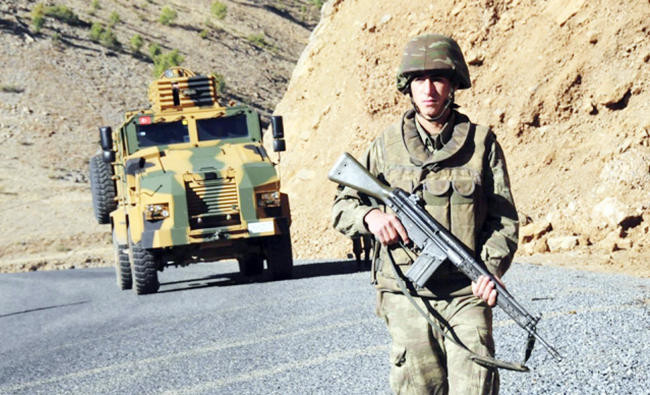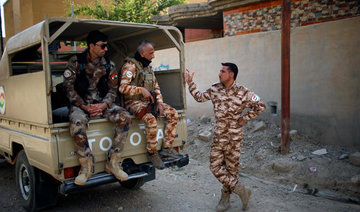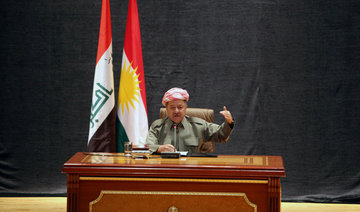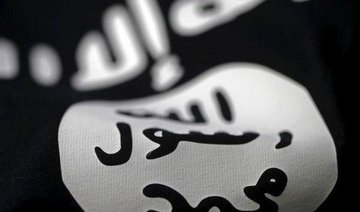ANKARA: Regional actors are concerned about the referendum on Iraqi Kurdish independence, scheduled for Sept. 25.
The US, requesting a postponement, has voiced concerns that the referendum will hinder the war against Daesh. Turkey says the vote will violate Iraq’s constitution and further undermine regional stability.
Ankara has called the decision to hold a referendum a “serious mistake.” Presidency spokesman Ibrahim Kalin said Turkey perceives the vote as a “wrong step” that will not resolve any of Iraq’s problems.
Turkey’s Deputy Prime Minister Bekir Bozdag on Tuesday emphasized Ankara’s concerns, which are shared by its neighbors.
Iran’s Chief of Staff Mohammad Baqeri visited Ankara to discuss with his Turkish counterpart Gen. Hulusi Akar the referendum and its regional repercussions. Iran and Turkey have long been fighting their own Kurdish separatists.
With the Kurdish People’s Protection Units (YPG) militia gaining territory in northern Syria, Ankara fears that events could spiral out of its control and result in another Kurdish entity on its border.
The referendum will have consequences for energy cooperation between Turkey and the Kurdistan Regional Government (KRG) in northern Iraq, especially in terms of oil.
For Ankara, promoting regional stability and deterring Kurdish separatism mean securing energy flows.
Last week, Turkish Energy Minister Berat Albayrak said if the KRG insists on holding the referendum, northern Iraq will pay a price. “Northern Iraq knows that its only regional ally is Turkey,” he said.
Since 2014, Turkey and Iraqi Kurdistan have had an energy agreement that allows the pumping of hundreds of thousands of barrels of oil via a route controlled by the KRG.
Filiz Katman, an international relations professor at Istanbul Aydin University, said the referendum will harm relations between Turkey and the KRG that have benefited both sides. Bilateral trade amounts to $8.5 billion, with huge energy projects in the pipeline.
“The red line in Turkey’s policy is the preservation of Iraq’s territorial integrity,” Katman told Arab News, adding that Ankara is using the energy card as leverage.
“Turkey plays a key role in exporting oil through the Ceyhan pipelines to international markets.”
Cahit Armagan Dilek, director of the 21st Century Turkey Institute, said Ankara fears that the referendum could have a domino effect in Syria and then in Turkey.
“Another concern is that following the referendum, Kurds and Arabs in Iraq might begin fighting each other,” Dilek told Arab News, adding that Kurdish independence or conflict in northern Iraq could seriously undermine oil revenues.
“Although the central government in Bagdad may find a way out through maritime routes, the only outlet for the Kurds to sell oil is through Turkey.”
Dilek said the principal actor determining events in northern Iraq is the US, which objects to the referendum.
Given that the KRG is adamant on holding the referendum, “the wisest solution for the US is to allow it to go ahead, but the KRG should then wait for the anti-Daesh struggle to succeed before implementing the referendum result,” Dilek added.
Bilgay Duman, an expert from the Ankara-based think tank ORSAM, said Ankara will take necessary measures ahead of the referendum.
“Although Turkey won’t prevent the transit of humanitarian goods, it might consider closing the main Habur border crossing with Iraq, which means many KRG resources will be hindered,” Duman told Arab News, adding that Ankara might also halt, then close, the pipeline carrying KRG oil through Turkey.
“Turkey’s foreign policy priority is to maintain Iraqi territorial integrity and political unity,” he said.
Ankara will not intervene militarily if it does not feel an immediate threat, Duman said. It will instead strengthen ties with Iraq’s central government and Turkmens, and cooperate further with likeminded countries, he added.
Kurdish independence referendum in Iraq to undermine regional stability: Turkey
Kurdish independence referendum in Iraq to undermine regional stability: Turkey

UAE warns against ‘miscalculated actions’ in Israeli-Iranian conflict, calls for immediate ceasefire
UAE warns against ‘miscalculated actions’ in Israeli-Iranian conflict, calls for immediate ceasefire

- Foreign Minister Sheikh Abdullah bin Zayed Al-Nahyan says Emirati leadership is dedicated to promotion of stability, prosperity and justice
- He highlights ‘the risks of reckless and miscalculated actions that could extend beyond the borders’ of Israel and Iran
LONDON: As military exchanges between Israel and Iran continued on Tuesday for a fifth consecutive day, the UAE’s minister of foreign affairs, Sheikh Abdullah bin Zayed Al-Nahyan, warned of the wider threat posed by the continuing conflict and called for an immediate ceasefire.
“There is no alternative to political and diplomatic solutions,” he said, calling on the UN and its Security Council to intervene and halt the escalating violence.
He also highlighted “the risks of reckless and miscalculated actions that could extend beyond the borders” of Israel and Iran, the Emirates News Agency reported.
The UAE believes “a diplomatic approach is urgently required to lead both parties toward deescalation, end hostilities, and prevent the situation from spiraling into grave and far-reaching consequences,” he added.
The goal of international diplomacy, he said, must be to immediately halt hostilities, prevent the conflict from spiraling out of control, and mitigate its effects on global peace and security.
The UAE condemned the Israeli airstrikes on Iran that began on Friday, which have targeted nuclear sites, military leaders, intelligence chiefs and atomic scientists. Iran has responded by firing ballistic missiles at Israeli towns and cities along the Mediterranean, including Tel Aviv, Rishon LeZion and Haifa.
Sheikh Abdullah said the Emirati leadership is dedicated to the promotion of stability, prosperity and justice, and he stressed the urgent need for wisdom in a region long embroiled in conflicts.
“The UAE believes that promoting dialogue, adhering to international law and respecting the sovereignty of states are essential principles for resolving the current crises,” he added.
“The UAE calls on the United Nations and the Security Council to fully uphold their responsibilities by preventing further escalation, and taking urgent and necessary measures to achieve a ceasefire and reinforce international peace and security.”
At least 60 people feared missing in two deadly shipwrecks off Libya, IOM says

- IOM says shipwrecks happened off the Libyan coast
CAIRO: At least 60 people were feared missing at sea after two deadly shipwrecks off the coast of Libya in recent days, the International Organization for Migration said on Tuesday.
Russia says Israel attacks on Iran are illegal, notes Iran’s commitment to NPT

- The statement said Moscow was waiting for the International Atomic Energy Agency to provide “unvarnished” assessments of the damage caused to Iranian nuclear facilities by Israeli attacks
MOSCOW: Russia’s Foreign Ministry on Tuesday denounced continued Israeli attacks on Iran as illegal and said a solution to the conflict over Tehran’s nuclear program could only be found through diplomacy.
A ministry statement posted on Telegram noted Iran’s “clear statements” on its commitment to adhere to the nuclear non-proliferation treaty and its willingness to meet with US representatives.
The statement also said Moscow was waiting for the International Atomic Energy Agency to provide “unvarnished” assessments of the damage caused to Iranian nuclear facilities by Israeli attacks.
Qatari emir and Turkish president discuss Israeli attacks on Iran

- Sheikh Tamim bin Hamad Al-Thani and Recep Tayyip Erdogan emphasize important need to deescalate conflict and find diplomatic solutions
LONDON: Sheikh Tamim bin Hamad Al-Thani, the Emir of Qatar, and Turkish President Recep Tayyip Erdogan on Tuesday discussed Israel’s ongoing attacks on Iran, which began on Friday and have targeted nuclear sites, military leaders, intelligence chiefs and atomic scientists.
During their call, the leaders emphasized the important need to deescalate the conflict and find diplomatic solutions, the Qatar News Agency reported.
Earlier in the day, the Qatari minister of state for foreign affairs, Mohammed Al-Khulaifi, warned during a call with Rafael Grossi, the director general of the International Atomic Energy Agency, that the targeting of Iranian nuclear facilities by Israel represented a serious threat to regional and international security.
The IAEA reported on Monday that an Israeli airstrike on Iran’s Natanz Nuclear Facility on Friday had damaged centrifuges at the underground uranium-enrichment plant, raising concerns about possible radiological and chemical contamination in the area.
Qatari minister of state, IAEA chief discuss ‘serious threat’ of Israeli strikes on Iran’s nuclear sites

- Mohammed bin Abdulaziz Al-Khulaifi reiterates Qatar’s condemnation of attacks on Iranian territory
- He said targeting nuclear facilities threatens regional, international security
LONDON: The Qatari Minister of State for Foreign Affairs Mohammed bin Abdulaziz Al-Khulaifi on Tuesday discussed the conflict between Israel and Iran with Rafael Grossi, the director general of the International Atomic Energy Agency.
Al-Khulaifi discussed in a call the Israeli attacks on Iranian nuclear facilities that began on Friday, targeting the Natanz, Fordo, and Isfahan nuclear sites.
Al-Khulaifi stressed that targeting nuclear facilities was a serious threat to regional and international security. He reaffirmed Qatar’s commitment to dialogue to resolve conflicts and achieve peace in the region.
The officials discussed ways to improve the security of nuclear facilities and ensure they are safeguarded against threats, the Qatar News Agency reported.
Al-Khulaifi reiterated Qatar’s strong condemnation of the Israeli attacks on Iranian territory, deeming them blatant violations of Iran’s sovereignty and security, the QNA added.
The IAEA reported on Monday that the Israeli airstrike on Iran’s Natanz facility on Friday damaged the centrifuges of the underground uranium enrichment plant, raising concerns about potential radiological and chemical contamination in the area.






















